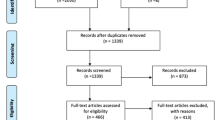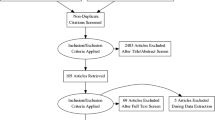Abstract
Among Canadians aged 25–64 years, 32% of those without disabilities have a university degree, while the figure among those with disabilities is only 13%. Mental health is defined as a state of well-being in which an individual realizes their potential, and can cope and work productively. According to Statistics Canada (2016), mental illness is the most dominating disability among Canadians between 15 and 24 years of age. Health professional programs can be an intense experience. While the number of students with mental illness in post-secondary institutions is on the rise, students and faculty are asking how to accommodate students. The purpose of this paper is to examine and map what we know about university students’ mental health experiences in health and allied healthcare university programs. We included 17 articles in our scoping review methodology. We used data between 2003 and 2017 from databases such as MEDLINE, CINAHL, ProQuest, PsycINFO, and gray search areas. Two team members independently screened for articles. Data was presented in a table guided by the research question. The scoping review revealed four broad themes: (1) prevalence; (2) environment; (3) ethics issues and relationships; and (4) coping: being silent. While mood disorder and anxiety dominated students’ experiences, most responded by being silent. Although the prevalence of mental illness and health in university has been examined in the literature from medical and psychology frameworks, there remains a paucity of literature evaluating strategies to support students, particularly accommodating students with clinical/practicum-based programs. Further clinical, education, and research implications are discussed.

Similar content being viewed by others
References
Aase, K., Friberg, F., & Haraldseid, C. (2015). Nursing students’ perceptions of factors influencing their learning environment in a clinical skills laboratory: a qualitative study. Nurse Education Today, 35(9), 1–6.
Abedi, H. A., Alavi, M., Irajpour, A. R., & Nasiri, A. (2009). Barriers to clinical education: student nurses’ experiences. Scientific Quarterly of British journal and Nursing and Midwifery Faculty, 6(1), 5–11.
Arksey, H., & O’Malley, L. (2005). Scoping studies: towards a methodological framework. International Journal Social Research Methodology, 8(1), 19–32.
Auerbach, R. P., Alonso, J., Axinn, W. G., Cuijpers, P., Ebert, D. D., Green, J. G., et al. (2016). Mental disorders among college students in the World Health Organization World Mental Health Surveys. Psychological Medicine, 46(14), 2955–2970.
Baraz, S., Memarian, R., & Vanak, Z. (2015). Learning challenges of nursing students in clinical environments: a qualitative study in Iran. Journal of Education Health Promotion, 4(52), 1–9.
Bartlett, M. L., Taylor, H., & Nelson, J. D. J. (2016). Comparison of mental health characteristics and stress between baccalaureate nursing students and non-nursing students. Journal of Nursing Education, 55(2), 87–90.
Berger, B., & Sossin, L. (2017). Exam should test mental ability not mental health. National Post. Retrieved from http://nationalpost.com/opinion/benjamin-berger-and-lorne-sossin-exams-should-test-mental-ability-not-mental-health.
Brown, T., Andrews, G., Cummins, S., Greenhough, B., Lewis, D., & Andrew, P. (2017). Health geographies: a critical introduction. Oxford: John Wiley & Sons.
Canadian Nursing Students’ Association. (2015). Position statement: accommodation within clinical placements for students with temporary, transient, or sporadic disability or injury. Retrieved from http://cnsa.ca/wp-content/uploads/2016/01/NA-Position-Statement-Accommodation-within-Clinical-Placements-for-Students-with-Temporary-Transient-or-Sporadic-Disability-or-Injury-1.pdf.
Carroll, S. M. (2004). Inclusion of people with physical disabilities in nursing education. Journal of Nursing Education, 43(5), 207–212.
Centre for Human Right York University, Annual report(2016). Retrieved from http://rights.info.yorku.ca/interactive-annual-report/#squelch-taas-tab-content-0-1.
Chew-Graham, C., Rogers, A., & Yassin, N. (2003). I wouldn’t want it on my CV or their record: medical students’ experiences of help-seeking. Medical Education, 37, 873–880.
Council of Ontario Universities (2017). In it together: action on student mental health. Retrieved from http://cou.on.ca/reports/in-it-together/.
Dahlin, M., Joneborg, N., & Runeson, B. (2005). Stress and depression among medical students: a cross-sectional study. Medical Education, 39(6), 594–604.
Dahlqvist, V., Soderberg, A., & Norberg, A. (2008). Dealing with stress: patterns of self-comfort among healthcare students. Nurse Education Today, 28(4), 476–484.
Garett, R., Liu, S., & Young, S. D. (2017). A longitudinal analysis of stress among incoming college freshmen. Journal of American College Health, 65(5), 331–338.
Gorter, R., Freeman, R., Hammen, S., Murtomaa, H., Blinkhorn, A., & Humphris, G. (2008). Psychological stress and health in undergraduate dental students: fifth year outcomes compared with first year baseline results from five European dental schools. European Journal of Dental Education, 12(2), 61–68.
Govender, P., Mkhabela, S., Hlongwane, M., Jalim, K., & Jetha, C. (2015). OT student’s experiences of stress and coping. South African Journal of Occupational Therapy, 45(3), 34–38.
Gulli, C. (2016). How universities are helping students with disabilities. Macleans Magazine, Retrieved from http://www.macleans.ca/society/health/how-universities-are-helping-students-with-invisible-disabilities/.
Haraldseid, C., Friberg, F., Aase, K. (2015). Nursing Students’ Perceptions of Factors Influencing Their Learning Environment in a Clinical Skills Laboratory: A Qualitative Study. Nurse Education Today, 35(9), e1–6. https://doi.org/10.1016/j.nedt.2015.03.015.
Heck, E., Jaworska, N., DeSomma, E., Dhoopar, A. S., MacMaster, F. P., Dewey, D., & MacQueen, G. (2014). A survey of mental health services at post-secondary institutions in Alberta. The Canadian Journal of Psychiatry, 59(5), 250–258.
Heimberg, R. G., Hofmann, S. G., Liebowitz, M. R., Schneier, F. R., Smits, J. A., Stein, M. B., et al. (2014). Social anxiety disorder in DSM-5. Depression and Anxiety, 31(6), 472–479.
Hjeltnes, A., Moltu, C., Schanche, E., & Binder, P. E. (2016). What brings you here? Exploring why young adults seek help for social anxiety. Qualitative Health Research, 26(12), 1705–1720.
Holmes, A., & Silvestri, R. (2016). Rates of mental illness and associated academic impacts in Ontario’s college students. Canadian Journal of School Psychology, 31(1), 27–46 Retrieved from http://journals.sagepub.com/home/cjs.
Horgan, A., Sweeney, J., Behan, L., & McCarthy, G. (2016). Depressive symptoms, college adjustment and peer support among undergraduate nursing and midwifery students. Journal of Advanced Nursing, 72(12), 3081–3092.
Ijiri, L., & Kudzma, C. (2010). Supporting nursing students with learning disabilities: a metacognitive approach. Journal of Professional Nursing, 116(3), 149–157.
Kessler, R. C., Barker, P. R., Colpe, L. J., Epstein, J. F., Gfroerer, J. C., Hiripi, E. (2003). Screening for serious mental illness in the general population. Archives General Psychiatry, 60, 184–189. https://doi.org/10.1001/archpsyc.60.2.184.
Khalil, H., Peters, M., Godfrey, C. M., Mclnerney, P., Soares, C. B., & Parker, D. (2016). An evidenced based approach to scoping reviews. Worldviews on Evidence Based Nursing, 13(2), 118–123.
Khan A, Khanlou, N, Stol J, & Tran V. (2018). Immigrant and refugee youth mental health: a scoping review. In Pashang S, Khanlou N & Clarke J. (editors). Today’s youth and mental health: hope, power, and resilience. Advances in mental health and addiction (series editor: Masood Zanganeh). New York: Springer (pp. 3-20).
Langford, E. (2011). Exploring the learning experiences of nursing students with dyslexia. Nursing Standards, 25(40), 39–46.
Levac, D., Colquhoun, H., & O’Brien, K. K. (2010). Scoping studies: advancing the methodology. Implementation Science, 5(1), 1–9.
Link, B.G., Phelan, J. C. (2006). Stigma and its public health implications. Lancet, 367(9509), 528–529. https://doi.org/10.1016/S0140-6736(06)68184-1.
Luckowski, A. (2016). The lived experience in the clinical settings of nursing students with disabilities. Nursing Education Perspectives, 37(5), 256–261.
Magilvny, J. K., & Mitchell, A. C. (1995). Education needs of nursing students with special needs. Journal of Nursing Education, 34(1), 3135 Retrieved from https://www.healio.com/nursing/journals/jne.
Maheady, D. C. (1999). Jumping through hoops, walking on egg shells: the experiences of nursing students with disabilities. Journal of Nursing Education, 38(4), 162–170 Retrieved from https://www.healio.com/nursing/journals/jne.
Marks, B. A. (2007). Cultural competence revisited: nursing students with disabilities. Journal of Nursing Education, 46(2), 70–74 Retrieved from https://www.healio.com/nursing/journals/jne.
McPheat, C. (2014). Experience of nursing students with dyslexia on clinical placement. Nursing Standard, 28(41), 44–49.
Meeks, L., & Jain, N. (2015). The guide to assisting students with disabilities: equal access in health science and professional education. New York: Spring Publishing.
Moll, S., Eakin, J., Franche, R., & Strike, C. (2013). When health care workers experience mental ill health: institutional practices of silence. Qualitative Health Research, 23(2), 167–179.
Moore, C. (2004). Disability as a difference and the nursing profession. Journal of Nursing Education, 43(5), 197–201.
Morris, D. K., & Turnbull, P. A. (2007). The disclosure of dyslexia in clinical practice: experiences of student nurses in the United Kingdom. Nursing Education Today, 27(1), 35–42.
O’Carroll, P. J., & Fisher, P. (2013). Metacognitions, worry and attentional control in predicting OSCE performance test anxiety. Medical Education, 47(6), 562–568.
Othman, Z., & Lee, C. W. (2017). Internet addiction and depression among college students in Malaysia. International Medical Journal, 24(6), 447–450.
Peters, M. D., Godfrey, C. M., Khalil, H., McInenemey, P. J., & Soares, C. (2015a). International Journal of Evidence Based Healthcare, 13(3). 141–146.
Peters, M. D. J., Godfrey, C., McInerney, P., Baldini Soares, C., Khalil, H., & Parker, D. (2015b). Methodology for Joanna Briggs Institute (JBI) scoping reviews. The Joanna Briggs Institute reviewers’ manual. Retrieved from https://joannabriggs.org/assets/docs/sumari/Reviewers-Manual_Methodology-for-JBI-Scoping-Reviews_2015_v2.pdf.
Quinn, N., Wilson, A., MacIntyre, G., & Tinklin, T. (2009). ‘People look at you differently’: students’ experience of mental health support within higher education. British Journal of Guidance & Counselling, 37(4), 405–418.
Regier, D., Kuhl, E., & Kupfer, D. (2013). The DSM: classification and criteria changes. World Psychiatry, 12(2), 92–98.
Ridley, C. (2011). The experiences of nursing students with dyslexia. Nursing Standard, 25(24), 35–42.
Roberts, D., & Mitchell, D. (2005). Problem-based learning in nurse education: an unexpected problem for students with dyslexia. Nurse Education in Practice, 5(6), 328–332.
Rochette, A., & Loiselle, F. (2012). Successfully performing a university students role despite disabilities: challenges on an inclusive environment and appropriate task modification. Disability and Rehabilitation, 34(25), 2201–2206.
Ryan, J., & Struhs, J. (2004). University education for all? Barriers to full inclusion of students with disabilities in Australian universities. International Journal of Inclusive Education, 8(1), 73–90.
Shakespeare, T., & Watson, N. (2002). The social model of disability: an outdated ideology? Research in Social Science and Disability, 2, 928.
Stallman, H. M. (2010). Psychological distress in university students: a comparison with general population data. Australian Psychologist, 45(4), 249–257.
Statistics Canada. (2011). The classification of health instructional programs in Canada. Retrieved http://www23.statcan.gc.ca/imdb/p3VD.pl?Function=getVD&TVD=127939&CVD=127940&CPV=51.&CST=01012011&CLV=1&MLV=3
Statistics Canada. (2016). A profile of people with disability age 16–25. Retrieved from http://www.statcan.gc.ca/pub/89-654-x/89-654-x2015001-eng.htm.
Statistics Canada. (2017). Depression and suicidal ideation among Canadians aged 15 to 24. Vol. 28, no. 1, January. Statistics Canada Catalogue no. 82-003-X.http://www.statcan.gc.ca/pub/82-003-x/2017001/article/14697-eng.htm (accessed February 12, 2018).
Sun, F. K., Long, A., Tseng, Y. S., Huang, H., You, J., & Chiang, C. (2016). Undergraduate student nurses’ lived experience of anxiety during their first clinical practicum: a phenomenological study. Nurses Education Today, 37, 21–26.
Tharani, A., Husain, Y., & Warwick, I. (2017). Learning environment and emotional well-being: a qualitative study of undergraduate students. Nurse Education Today, 59, 82–87.
Tricco, A., Lillie, E., Zarin, W., O’Brien, K., Coquohoun, H., Kastner, M., et al. (2016). A scoping review on the conduct and reporting of scoping reviews. BMC Medical Research Methodology, 16(15), 15.
Vickerman, P., & Blundell, M. (2010). Hearing the voices of disabled students in higher education. Disability & Society, 25(1), 21–32.
Weiss, M. G. (2008). Stigma and the social burden of neglected tropical diseases. Neglected Tropical Diseases, 2(5), e237.
World Health Organization (2014). Mental health definition: a state of well being. Retrieved from http://www.who.int/features/factfiles/mental_health/en/.
Zhang, N., & Rabatsky, A. (2015). Effects of test stress during an objective structured clinical examination. Journal of Chiropractic Education, 29(2), 139–144.
Zhang, Y., Chernaik, M., & Hallet, K. (2017). Relationship issues among college nursing students: associations with stress, coping, sleep, and mental disorders. Teaching & Learning in Nursing, 12(4), 246–252.
Author information
Authors and Affiliations
Corresponding author
Ethics declarations
Conflict of Interest
The authors declare that they have no conflict of interest.
Additional information
Iris Epstein is the first author
Rights and permissions
About this article
Cite this article
Epstein, I., Khanlou, N., Balaquiao, L. et al. University Students’ Mental Health and Illness Experiences in Health and Allied Health Programs: A Scoping Review. Int J Ment Health Addiction 17, 743–764 (2019). https://doi.org/10.1007/s11469-018-9987-4
Published:
Issue Date:
DOI: https://doi.org/10.1007/s11469-018-9987-4




